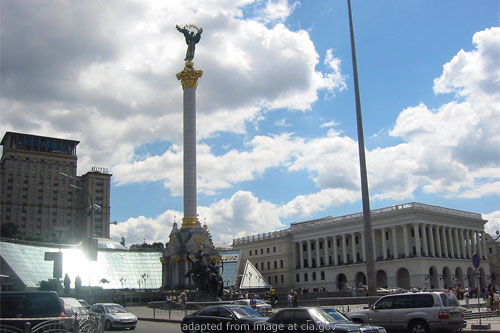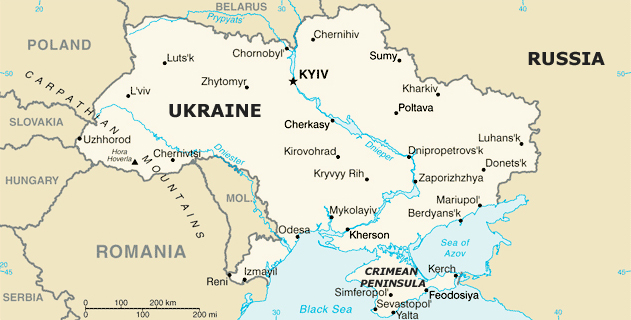Ukraine’s crisis, the west’s trap

(opendemocracy.net – Paul Rogers – March 6, 2014)
The dangerous stand-off with Russia over Ukraine is also a display of the west’s skewed perceptions and moral vanities.
Paul Rogers is professor in the department of peace studies at Bradford University, northern England. He is openDemocracy’s international-security editor, and has been writing a weekly column on global security since 28 September 2001; he also writes a monthly briefing for the Oxford Research Group. His books include Why We’re Losing the War on Terror (Polity, 2007), and Losing Control: Global Security in the 21st Century (Pluto Press, 3rd edition, 2010). He is on twitter at: @ProfPRogers
Video of the confrontation went round the world in just a few hours and seemed to capture the huge risks of a crisis transiting to war. A group of unarmed Ukraine soldiers was filmed marching determinedly from one part of their base in Crimea towards Russian troops, singing the national anthem on the way. The images were graphic, and became alarming when a few Russians fired warning-shots. After a brief exchange, the tense mood subsided. The Ukrainian soldiers failed to get through the Russian line, and retreated; the Russians were left looking aggressive, the message of Russian belligerence reinforced.
The whole scene appeared a near-spontaneous effort by a contingent of courageous Ukrainian soldiers peacefully to confront armed intruders they saw as trespassing on their territory. Courageous they probably were, since the episode could so easily have ended in bloodshed, but spontaneous it most certainly wasn’t. As a few commentators have remarked, this was a carefully planned demonstration accompanied by many TV and press reporters to record every detail.
Precisely who had orchestrated it, had choreographed the event and ensured the worldwide coverage is far from clear; but that is just as much the case for so many events during the past two weeks in Ukraine.
It is a crisis that offers little to either the United States or Russia (see Anatol Lieven, “Why Obama shouldn’t fall for Putin’s Ukrainian folly”, 3 March 2014). Though if it was to descend into war, it could be disastrous – not just for the people who would be killed and injured, but for Russia, much of Europe and the United States. Vladimir Putin may appear strong, and has certainly consolidated his authority over the past decade (see Dmitry Travin, “The three ages of Putinism”, 4 March 2014); but any war would have a crippling impact on Russia’s flawed economy, as well as limiting its potential to employ “soft power”.
The echoes
What is striking is how many elements of the confrontation are reminiscent of the cold war in the 1970s-80s, not least in the attitudes and atmosphere surrounding it. There is, for example, an almost unchallenged assumption in much of the western media reporting that Russia’s current military power is little different to that of the Soviet Union of that era. This is palpable nonsense.
The intervention in Georgia in August 2008 is a case in point. That short war included Russia’s extensive use of air-strikes. At the time, however, the Russian air-force was so underfunded that most of the frontline pilots were drawn from flying-instructors and test-pilots (who were among the few people with sufficient flying honours to be more than half-competent).
This is not to say that Ukraine is in military terms better off; in many respects its smaller forces are even more under-equipped and lacking in training. That, though, is not the point. What is relevant is that so much of the western media approach remains fixated on the notion that opposition to Russia entails standing up to a superpower.
In turn this connects to the perception in the United States that Obama is a weak president who needs to learn to “talk tough”. The psychology is reminiscent of the Jimmy Carter era (1976-80) where a powerful ideological drive on the Republican right pressed the aim of “making America strong again”. The crisis over Ukraine will reinforce existing Republican efforts to launch a repeat before the mid-sessional elections in November 2014 and the presidential campaign in 2016.
Perhaps most remarkable of all, though, is the assumption that Vladimir Putin’s Russia is damaging its wider image across the world – and that by implication the west both is and is seen by the entire world community as the “good guys”. Putin may well have escalated the crisis; but surreptitious western involvement in Ukraine’s domestic politics has been far more persistent than most people recognise, and this has contributed to the Russian president’s determination to safeguard Russia’s “near abroad”.
Western misconceptions reached their height in the deep irony of secretary of state John Kerry saying on 3 March (by all accounts with a straight face), “You just don’t, in the 21st century, behave in 19th-century fashion by invading another country on completely trumped-up pretexts.”
The illusion
Eleven years ago, the United States was about to invade Iraq, where it soon became embroiled in a bitter insurgency. George W Bush’s administration urgently scanned the world in search of countries that might provide troops in Iraq and thereby free up American forces to operate in the areas of greatest insurgent risk. India’s prime minister Atal Bihari Vajpayee, who headed the nationalist BJP government, was willing to commit a reinforced division of more than 16,000 troops for just that role; but India’s electorate proved anything but willing. Vajpayee’s party faced state elections later in 2003 and a general election in spring 2004, and the prospect of a heavy popular backlash led him reluctantly to decline the US request, much to the Bush administration’s surprise and dismay (see “Far from home, alone”, 16 July 2003).
Bush’s advisers had misjudged the wider mood, both in India and in other states across the globe (including friendly ones such as Turkey). John Kerry, Barack Obama and their advisers are doing the same now. This in no way excuses Putin and his policies, but it is a salutary reminder of the persistence of the idea of western superiority, itself stemming from deep-rooted moral righteousness. It is an idea all too rarely challenged, and the Ukraine crisis shows how important it is to do so.
Article also appeared at http://www.opendemocracy.net/paul-rogers/ukraines-crisis-wests-trap bearing the following notice:
 This article is published under a Creative Commons Attribution-NonCommercial 3.0 licence. If you have any queries about republishing please contact us. Please check individual images for licensing details.
This article is published under a Creative Commons Attribution-NonCommercial 3.0 licence. If you have any queries about republishing please contact us. Please check individual images for licensing details.

